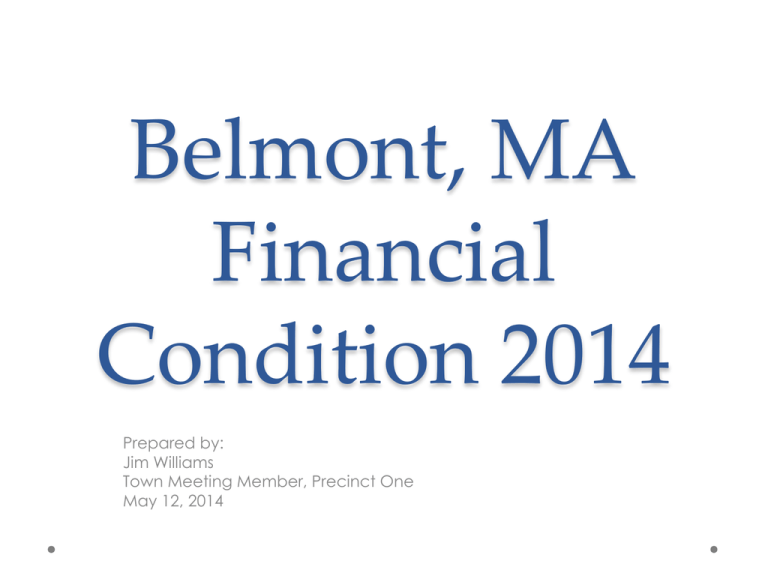Belmont, MA Financial Condition 2014
advertisement

Belmont, MA Financial Condition 2014 Prepared by: Jim Williams Town Meeting Member, Precinct One May 12, 2014 Foreword • My name is Jim Williams. We moved from NYC in 2011 so my wife, who is from Cambridge, could be closer to her parents. The known excellence of the Belmont school system and proximity to Cambridge greatly influenced our choice as we still have one child at home who now attends Chenery. We have been happy with our decision as we have many nice neighbors, our daughter is doing well, and we have been needed by the family. • Since I am “retired” after a 35 year commercial banking career, I have involved myself in the local political process by working on Bobby Reardon’s, Dave Rogers’, and Will Brownsberger’s campaigns. (i.e. sign holding/yard signs/canvassing). When I noticed that only nine people had signed up for Town Meeting in Precinct 1 for this year’s election, I put my “hat in the ring” and was pleasantly surprised to be elected. (i.e. 11th). I’m grateful for the opportunity to participate in a Town Meeting democracy as a voting member and have been impressed by the quality of the process and discussions. • However, given long experience in commercial banking credit, one concern I had for Belmont was that the unfunded pension and other post employment benefits obligations were reportedly $100 million and $200 mio respectively. Objectively these are very large numbers in the context of the Town’s current revenue base of some $100 mio. My campaign handout indicated the concern that such obligations can “overwhelm” any budget. Since the election, research has now confirmed this view. Since some say that you don’t really know what you think until you try to write it down, I’ve done that and offer the following 12 page Power Point Presentation for your consideration in connection with the upcoming vote on articles 24 and 20 of the 2014 Belmont Annual Town Meeting Warrant. Concern • Management’s Discussion and Analysis in Belmont’s fiscal year ended 6/30/2013 report states (pp7) that “…the Town does not have enough reserves to meet its ongoing short term and long term obligation to its citizens and creditors.” • As an example, the net position for “Government Activities” reported on pp 6 declined 7.4% from $85.0 million at 6/30/2012 to $78.7 million at 6/30/2013 due primarily to “the recognition of liability associated with GASB Statement #45” relating to a $13.1 million increase in the OPEB liability. • If this continues, as it is likely to do unless some change is made by the Town, the net position for Government Activities will most likely decline to less than zero within 5 years for the same reason. • This result will render the Town Government Activities “insolvent” by definition and could possibly trigger a downgrade in the Town’s bond rating by Moody’s as its most recent rating holds “failure to address long term fixed costs, including pension and OPEB obligations” as one of four reasons that “ Could Change the Rating Down”. GASB 45 • In addition to salaries and pensions, many state and local governmental employers provide other post employment benefits (“OPEB”) as part of total employee compensation. • OPEB includes postemployment healthcare, as well as other forms of postemployment benefits (e.g. life insurance) when provided separately from a pension plan. • GASB 45 is the Government Accounting Standards Board statement that requires accounting and financial reporting by employers for post employment benefits (“OPEB”) other than pensions (issued 6/04) Employee Compensation • Of the total compensation offered by employers, salaries, pension contributions and active-employee healthcare expenses, are paid “as you go” while the employees are in active service. Whereas other benefits, including postemployment healthcare and other OPEB, are paid after the employees’ services have ended. • Nevertheless, both types of “benefits” constitute compensation for employee services. • Accordingly, the cost of OPEB, like the cost of pension benefits and all other expenses, generally should be associated with the period in which the exchange occurs, rather than with the periods (often many years later) when benefits are actually paid. This approach is known as accrual accounting which appropriately recognizes expenses in the period in which they are incurred. • Hence, GASB 45. Belmont’s OPEB Obligations • In footnote 13 to the 2013 annual report, the “net OPEB obligation for fiscal 2013” (i.e. June 30, 2013) is reported as $57.6 million. Also, the actuarial accrued liability for OPEB was reported as $196 million as of July 1, 2012 of which the Town had funded approx. $1.3 million. • Another report (i.e. “Town of Belmont, Other Postemployment Benefits Program, Actuarial Valuation, July 12, 2012”) estimates the Town’s unfunded actuarial accrued liability for OPEB to be $195,943,349 at the beginning of fiscal 2013 (i,.e. 7/01/2012) and $206,126,540 at the end of fiscal 2013 (i.e. as of 6/30/2014). • This report’s estimate is consistent with the numbers reported in the Town’s 2013 annual report in that the beginning year estimate opens at $196 million and shows the liability increasing some $10 million during the year as the Town’s allocation to OPEB is less than what’s needed to pay current expenses and fund future obligations incurred during fiscal 2013. Belmont’s OPEB Obligation Belmont’s OPEB Obligations • Additionally, a review of Section 4 – Forecast of the OPEB Actuarial Valuation report shows The Town’s unfunded actuarial accrued liability growing to $580 million by 2043 after providing some $270 million in funding beginning essentially in 2028. • This result indicates that the Town is not currently planning to fully fund its OPEB obligations during the forecast period and, instead, has chosen to nearly triple the unfunded OPEB liability by not doing so. • The total actuarial accrued liability at the end of fiscal 2043 is $850,730,322 of which 68 % remains unfunded after 30 years. Remedies ??? • Approximately $25,000 per tax paying household (i.e. 8,500 assumption) would be needed to fund the $217 million existing OPEB obligations already incurred at fiscal year end 2014 (i.e. 6/30/2014). • Also, an increase of ~$20 million in annual real estate and personal property taxes would be needed to fund OPEB obligations going forward from year end 2014. • This would represent an increase in real estate and personal property taxes of 28.2% over 2013 receipts. Belmont’s Pension Obligations • • • • • There is a similar “problem” with pensions. However, it has been “resolved” by the Town agreeing to fund a current estimate of $67 million for the unfunded portion of the pension obligation thru 2027. The annual cost of this funding escalates from $6.5 million in fiscal 2013; to ~$10 million by 2020; to ~$12 million by 2025 and reduces to ~$2.5 mio thereafter as the unfunded liability is eliminated. Although “resolved”, the impact of the solution is to take any amounts expended over $2.5 million away from other Town needs until the unfunded amount is funded. That amount for 2014 is $4.4 million. Also, the discount rate used used in the pension actuarial valuation is 7.5% which is arguably high. If a 4.5% discount rate were used as in the OPEB valuation, the unfunded asset liability would increase by ~60% to $107 million. Also, GASB #68 and #69 which relate to accounting and financial reporting for pensions are scheduled to be implemented in fiscal 2014 an 2015 respectively. It is likely that these statements address reporting on unfunded pension obligations as does GASB 45 for OPEB Process • The Town is required by Municipal law to adopt a balanced budget annually that is approved by the Board of Selectmen and presented to the representative Town Meeting each year which has the authority to amend, reject or approve the budget or any line item by majority vote. • Consequently, Town Meeting members should be fully informed on all aspects of the proposed budget in order to responsibly vote for approval as approved and presented by the Selectmen. • Given the substantial and material future obligations estimated for OPEB and pension obligations, Town Meeting members must familiarize themselves with the following documents in addition to those provided in accordance with the proposed Article 20 and Article 24: 1. 2. 3. 4. 5. Town of Belmont, Massachusetts, Report on Examination of Basic Financial Statements, Fiscal Year Ended June 30, 2013 Town of Belmont, Other Postemployment Benefits Program, Actuarial Valuation, July 1,2012 Report on the January 1, 2012 Actuarial Valuation of the Belmont Contributory Retirement System Moody’s new issue Global Credit Research Opinion as of 01 April 2014 Powers and Sullivan’s Belmont Internal Control Report dated January 16, 2014 For Your Consideration (1 0f 2) • Powers and Sullivan, LLC should present a report to the 2014 Town Meeting explaining the import of their unqualified opinion of Belmont’s 2013 basic financial statements focusing on GASB’s #45, 68, and 69. • Also, Powers and Sullivan should be engaged by the Town to audit the “required” and “essential” supplementary information” and to express an opinion on same focusing again on pension and OPEB obligations in connection with the fiscal 2014 audit. • The Management’s Discussion and Analysis report in the annual report should be be signed by the Town’s Selectmen and Treasurer to evidence their agreement even though it’s obviously implied by the current signature “Town of Belmont”. • Town authorities, Powers and Sullivan, and representatives of KMS Actuaries, LLC should present a report to the 2014 Town Meeting explaining the bases for estimating Belmont OPEB obligations and its impact on Belmont’s financial condition. • Similarly, Town authorities, Powers and Sullivan, and Buck Consultants should also present to the 2014 Town Meeting concerning the bases for estimating Belmont’s pension obligations and its impact on Belmont’s financial condition For Your Consideration (2 of 2) • The OPEB benefit provisions are negotiated between the Town and the unions representing Town employees and are renegotiated each bargaining period. Given the substantial and material liabilities assumed by the Town and its citizens in these negotiations, they should be open to the public if they are not and approved by Town Meeting in advance of any commitment made on behalf of the Town if they are not. • Also, the Retiree Health Plan does not issue a publicly available financial report. Again, given the substantial and material liabilities assumed by the Town and its citizens with regard to the Retiree Health Plan, a financial report should be publicly available. • In any case, OPEB have historically been paid “as you go”. However, their expense has ballooned as a result of increasing healthcare costs. Accordingly, GASB 45 was implemented (6/04) to track the expected future cost of the benefits as the obligations are incurred and to provide a net present valuation of these obligations to inform parties as to the financial condition of the benefit provider. • However, the Town is not required by law to prefund these obligations as it is required to for pension obligations and, in fact, can continue to pay such benefits “as you go”. Accordingly, both the Town and its employees must be mindful of agreeing to benefits that are within the financial capability of the Town to provide when due and payable.





